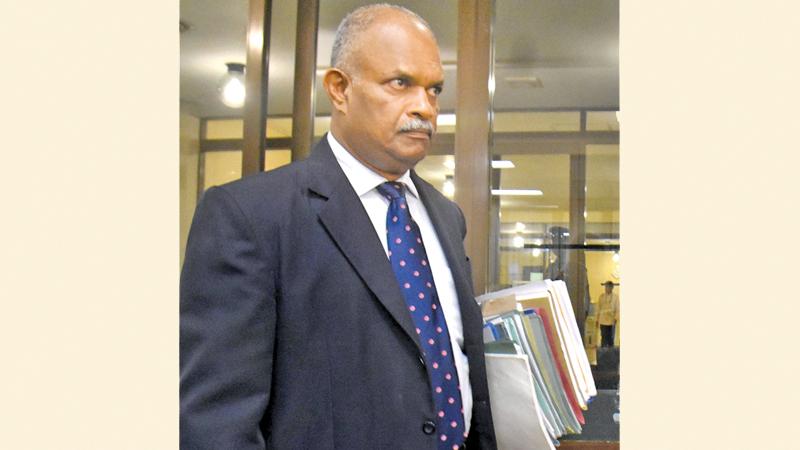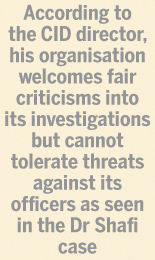
For nearly 150 years the Criminal Investigations Department of the Sri Lanka Police has been tasked with solving heinous crimes committed in the country. In recent times its prominence has grown only after being tasked with investigating a number of controversial cases since 2015. Currently, the seemingly understaffed CID, has its nearly 600 officers investigating into 10, 379 open cases.
But since 2015, it has been a rough going for the Department. Tasked with investigating prominent cases such as the Ekneligoda disappearance, Upali Tennekoon assault and Lasantha Wickrematunge assassination the CID has had to cross paths with the country’s military and their intelligence services. They were accused of imprisoning ‘War Heroes’. Most recently the CID was also slammed by far-right nationalists of being partisan to Kurunegala Base Hospital’s Dr Shafi Shihabdeen who was accused of illegally sterilizing Sinhalese mothers. Following investigations, the CID told courts there was no evidence to prove the doctor had carried out such acts. The statement earned CID the wrath of nationalists such as MP Athuraliya Rathana Thera.
 Despite the allegations the CID has often kept silent, its Director not easily approachable to public nor media. According to him the CID as its mascot the owl has often chosen to remain silent and keep watch from a distance. But setting convention aside this week Director of the CID, SSP Shani Abeysekara sat down with media personnel to answer some tough questions and allegations against the Department.
Despite the allegations the CID has often kept silent, its Director not easily approachable to public nor media. According to him the CID as its mascot the owl has often chosen to remain silent and keep watch from a distance. But setting convention aside this week Director of the CID, SSP Shani Abeysekara sat down with media personnel to answer some tough questions and allegations against the Department.
Right off the bat, Abeysekara denied one of the main allegations levelled against the CID which claimed the Department had it out for ‘War Heroes’ in the country. Since 2015 the CID has been instrumental in putting a large number of military intelligence personnel and military big wigs in remand prison after the CID investigators linked them to a number of murders and abductions which took place in the country prior to 2015 such as the Lasantha Wickremtunge and Waseem Thajudeen murders. According to the plainspoken Abeysekara, the CID did not pursue ‘Ware Heroes’ but in fact investigations into crimes committed by them had come in search of the CID. The disappearance of journalist Prageeth Ekneligoda who was allegedly abducted by military intelligence officials was the first case of its kind that was handed over to CID sleuths in 2015.
“On March 12, 2015, the IGP handed over the Ekneligoda case to the CID” Abeysekara recalled. Till then, the case had exchanged several hands, finally landing with the Colombo Crimes Division on the request of Former Senior DIG Anura Senanayake, where it had made little progress. But by August that year, the CID nabbed eight suspects believed to have had a role in the journalist’s disappearance. One of the main suspects Lieutenant Shammi Kumararathan had admitted to the abduction, CID had also gathered other witness evidence. The investigation was also supported by phone analysis to prove the military intelligence officials had abducted the journalist.
Though the CID was slammed for the arrests, Abeysekara revealed the CID provided better facilities to the accused as they were military personnel. “Perhaps for the first time suspects were allowed to use the washroom of a gazetted officer in the Police,” he said adding that a branch of the CID was cleared, beds with mattresses put in, televisions and fans installed, all for the benefit of the military suspects. Friends and family were also given unrestricted access to them. “But as the CID ensured their welfare they paid in kind by filing eight fundamental rights petitions against me funded by the Army” he added.
The CID director also struck down the notion that Easter Sunday attacks had taken place due to the arrests of military intelligence personnel due to their connections to a number of criminal cases. “Prior to August 2015 no intelligence officials were in prison but did horrific attacks not take place?” he questioned.
“We are talking about military intelligence services which could not avert the attacks on the Commanders of the Army and Navy in this country” he noted.
However, though the CID is merely the arm of the Police, criticism was also levelled against the agency for not playing a more active role in nabbing National Thowheed Jamath (NTJ) Leader Zahran Hashim and uncovering the plans of the act committed on Easter Sunday. According to Abeysekara, his agency had traced an SMS sent by those who attacked the Buddha statues in Mawanella which led them to the farm in Wanathawilluwa where a haul explosives belonging to the NTJ were found on January 17 this year. Abeysekara said once the name of the NTJ and Zahran was revealed by the suspects arrested there the CID had done its best to trace Hashim. “We travelled across the country to areas such as Katupotha, Nuwaraeliya, Mawanella, Kannatukuy, Mannar and Kuliyapitiya” he revealed adding that however communication application ‘Threema’ used by the NTJ was a major stumbling block for the CID. “Special features which deleted calls immediately could not be traced thereafter” he added.
Since the attacks, the CID has been able to freeze Rs 134 million in bank accounts belonging to 41 individuals and companies suspected to have links to the NTJ and Easter Sunday terrorist attacks. The CID Director also said assets worth over Rs 1 billion belonging to those suspects and companies have also been identified. “63 suspects are currently held in custody including 12 hardcore terrorists” he added.
The CID director also stood by his agency’s investigations into the Dr Shafi Shihabdeen case. According to him personal connections or any other elements are not taken into consideration in CID investigations while officers go the extra mile to educate themselves about subjects unfamiliar to them when handed a case. “In this case, we spoke to numerous experts to understand the surgical procedures conducted” he added.
Abeysekara also explained that the CID cannot simply arrest a person based on information without sufficient evidence. The CID director was referring to allegations that the CID has not arrested individuals who had ordered for crimes to be committed such as in the Lasantha Wickramatunge and Thajudeen case. “If we wrongfully arrest a person without sufficient evidence we have to face severe consequences” he noted.
According to the CID director, his organisation welcomes fair criticisms into its investigations but cannot tolerate threats against its officers as seen in the Dr Shafi case. Investigations cannot take place to please various elements, the top CID sleuth added. “Despite criticisms, the CID will continue to go in search of the truth to ensure justice is served” Abeysekara affirmed.
